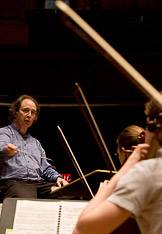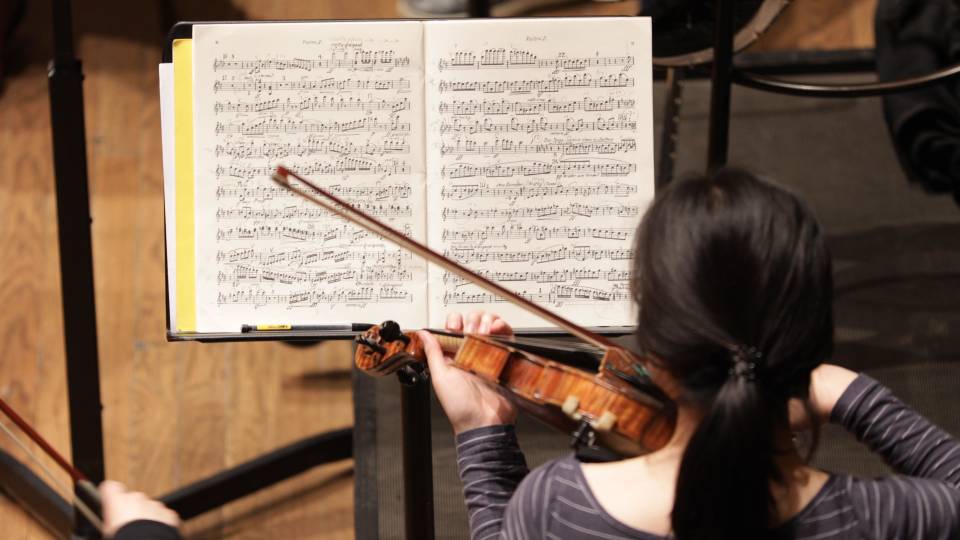The 17 seniors in the Princeton University Orchestra will conclude their tenure with the group by tackling one of the most difficult pieces they've ever played in concerts at 8 p.m. Friday and Saturday, April 25-26, in Richardson Auditorium, Alexander Hall.
The orchestra will perform Gustav Mahler's monumental Ninth Symphony to end the 2007-08 season. The Mindlin Memorial Concerts also will mark the culmination of conductor Michael Pratt's 30th season at Princeton. He believes it is the first Princeton performance of this great work of music, which is the only piece on the program.
"It's an exceptional challenge," Pratt said. "I think probably the only piece we've ever done that approaches Mahler Nine is 'The Rite of Spring' by Stravinsky -- we've done that a couple of times, although it's not nearly as long."
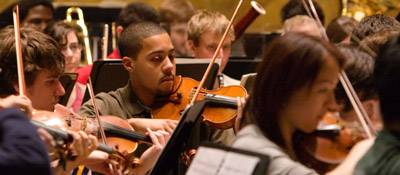
The Mahler piece is difficult both in its composition and in its themes, according to Pratt, requiring much concentration by him and the student musicians. "It's a deeply moving work about the profoundest issues that we all face: of life, death, impermanence," Pratt said. "It can seem forbidding at first. On the other hand, the music is so passionately beautiful, that it draws one into that world."
The piece is Mahler's last complete work, written between 1908 and 1910. He did not live to hear the first performance of the symphony in Vienna in 1912.
"Like all late Romantic music, the musical language had become far more complicated, more chromatic -- if it were on a piano, there would be lots of black notes," Pratt said. "Mahler's music as he became older became more complicated in every way a piece can become more complicated, and he started out writing complex music. It's highly contrapuntal, that is to say many independent lines going at once rather than some people playing the accompaniment and others playing the melody."
The work reflects what was happening in Mahler's life at the time. He had lost a young daughter to diphtheria, he had concluded his brilliant but stormy tenure as director of the Vienna Court Opera and he had been diagnosed with fatal heart disease in his late 40s.
"It's a deeply moving work about the profoundest issues that we all face: of life, death, impermanence," Pratt said. "Most college students haven't yet grappled with those issues. So it's demanding for them to penetrate the emotional core of the work and to cast their imaginations ahead to later life. It can seem forbidding at first. On the other hand, the music is so passionately beautiful, that it draws one into that world.
"Not surprisingly," he said, "Princeton students are rising to the many challenges magnificently." Pratt said the work is difficult not only for the musicians, but for him as well.
"It's a huge challenge for the conductor too, maybe the biggest in the repertory, and I've taken many deep breaths coming up to the decision to program it," Pratt said. "To absorb it, then teach it, and finally (and hardest) to make a convincing presentation to an audience is something that I've been getting ready for years to do. And I hope I'm ready now."

Students audition every year for a spot in the orchestra, and then commit to rehearsing at least five hours a week.
A musical community
As he often does, Pratt used excerpts from the piece for auditions last fall. The 90-member orchestra is made up of Princeton undergraduate and graduate student musicians and is a voluntary and extracurricular activity. The students audition every year for a spot in the group, and then commit to rehearsing at least five hours a week.
The group typically loses about 20 percent of its members each year to graduation. The 17 seniors this year majored in 13 departments, ranging from molecular biology to operations research and financial engineering to the Woodrow Wilson School of Public and International Affairs.
"I wouldn't want to be without [the orchestra]," said Victor Amin, a chemistry major from Tampa, Fla., who plays the bassoon. "It's something I like to be a part of. It's just great to play these famous pieces of music. I could play the bassoon by myself, but I wouldn't play as much, I wouldn't interact with other musicians, and it wouldn't be as fulfilling an experience."
Amin said he approached learning the Mahler piece feeling a bit better that he already knew some of it from the audition.
"So the very hardest measures I already practiced over the summer in a relaxed setting," he said. "When we were reading it through for the first time this spring, we'd get to some measures and they'd sound really familiar, and I'd realize they were the audition measures. Other than that, we went through it once and I knew where the trouble spots were, and I'd practice those and bring them up with my teacher. Once you get the technical stuff out of the way early on, really there's not that much upkeep you have to do, it's just interpretation and jelling with the orchestra."
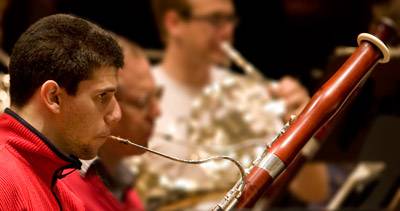
Victor Amin is one of the seniors who will be playing their last concert with the group. A chemistry major, he said he has enjoyed being part of the orchestra because "I could play the bassoon by myself, but I wouldn't play as much, I wouldn't interact with other musicians, and it wouldn't be as fulfilling an experience."
Amin has found time between his chemistry coursework and the orchestra to play in Sinfonia, another ensemble on campus involving some 50 musicians. He also was a member of the wrestling team for two and a half years and has designed websites for the Princeton Materials Research Society and the Princeton Figure Skating Club. After graduation, he plans to design websites for a year or two before possibly attending graduate school.
Last week he was in the throes of completing his senior thesis, and hoped to do so by the Wednesday before the concerts although it wasn't due until Friday.
"If that doesn't happen, then I will be working and going to dress rehearsals and working, turning my thesis in that afternoon and then going to the concert," he said. "But I hope it doesn't come to that!"
The Mindlin Concerts represent the fourth main program the orchestra has presented this year. Each program typically is presented twice for a minimum of eight concerts per year. Last year, the orchestra traveled to Budapest, Bratislava and Vienna, and collaborated on a production of "Boris Godunov" with other arts programs at the University, presenting a total of 16 concerts.
"I've really enjoyed traveling with the entire group on our tours -- we've been to Portugal and Central Europe since I've been at Princeton," said Suzanne Westbrook of Great Falls, Va., the only music major among this year's seniors. "It is amazing to be able to communicate with people of different cultures through the medium of music."

The 90-member orchestra is made up of Princeton undergraduate and graduate student musicians and is a voluntary and extracurricular activity. Junior Annabelle Beaver plays the harp.
Both Westbrook and Amin also are earning certificates in musical performance. A clarinetist, Westbrook has served as an Outdoor Action leader and a Butler College fellow. She has taught private clarinet lessons and volunteered at the University Medical Center at Princeton's emergency room. She has been accepted into the Johns Hopkins School of Medicine and plans to pursue a career as a practicing physician.
"In order to apply to medical school, one just needs to complete a certain set of science courses," she said. "I tried to get a sense of the medical profession in other ways, too -- volunteering, summer research, etc. I was worried about whether having a music major would hurt my prospects at first, but it certainly did not make it tough to get accepted into a medical school."
Westbrook said that her time getting ready for this concert -- and with the orchestra, in general -- has provided an opportunity for a welcome change of pace.
"I really enjoy playing, so preparing this challenging part really isn't stressful," she said. "I find it pleasant to take a break from other work and go practice. Working on something that's difficult but so different from school work is a sort of meditation: you work through problems without using words, but more abstract concepts of texture, shape and tone to guide you."
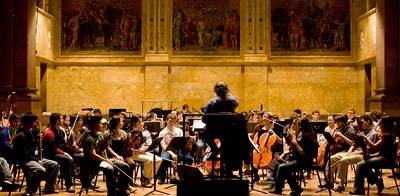
The orchestra typically performs eight concerts a year, and tours every other year. Last year, the orchestra traveled to Budapest, Bratislava and Vienna, and collaborated on a production of "Boris Godunov" with other arts programs at the University, presenting a total of 16 concerts.
Tickets to the concert are $5 for students (or free with Tiger Tickets), $12 for senior citizens and $18 for general admission. They are available online through University Ticketing or by calling (609) 258-9220.
Seniors in the orchestra and their majors
- Victor Amin, chemistry
- Dan-Meng Chen, Woodrow Wilson School
- Steven Chen, economics
- April Frieda, operations research and financial engineering
- Stan Gabryszewski, molecular biology
- Cecile Huttenhower, psychology
- Kieran Ledwidge, politics
- Julia Liu, physics
- Karl Meyer, mechanical and aerospace engineering
- Brian Nowakowski, mathematics
- Chris Pallotta, chemistry
- Sarah Vander Ploeg, Woodrow Wilson School
- Madeleine Walsh, religion
- Sarah Weinstein, philosophy
- Suzanne Westbrook, music
- Paul Yancich, religion
- Andris Zvargulis, chemistry
